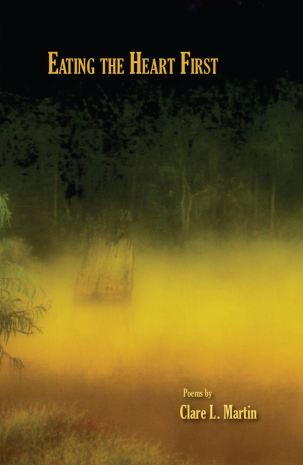To purchase directly from Press 53
Praise for Eating the Heart First
“Clare L. Martin has written a book of poems from the heart, that does indeed eat the heart. Her title is apt, perfect for these lyrical poems of loss and rebirth. It’s a whole life cycle in stops and starts, including the natural world which seems to lie at the core of the poems and what the author sees as a continuum. I was in awe of this book. Any author that can take a scalpel to body and mind, exposing the rawness and the blood-fever of humans, landscapes, the very air– that poet has seen some things. To be able to share them in words takes fortitude and a vast open heart. This is an impressive poetry collection that will stay with you. Highly recommended.”
— Susan Tepper, More about Susan at http://www.susantepper.com/
“Clare L. Martin is a fine young poet whose work is dark and lovely and full of a deep organic pulse. Like the landscape of her beloved Louisiana, her work is alive with mystery. You could swim in this hot water, but there are things down inside its darkness that might pull you away forever. It is an exquisite drowning.”
From the Gloom Cupboard review The Chiaro and the Scuro: Clare L. Martin’s “Eating the Heart First”
“Eating the Heart First (Press 53) by Clare L. Martin is a haunting, lyrical collection that cannot be read in a rush, or in a single sitting. Martin cleverly divides the book into several sections, which are micro-poems in themselves: “Fables of Skin,” “A Fire of Words,” and “All That We Conjure.” Nature’s dark side is revealed: images of winter, death, and storms abound. Martin pulls us in and out of a dozen different worlds in this collection, but nature, and its ubiquitous presence even in the most ordinary, domestic moments, grounds many of the poems.”
— Mariann Grantham D’Arcangelis, Poetry Reviewer at Gloom Cupboard.
An excerpt from a review by Stacia Fleegal for Blood Lotus: A Journal of Online Literature
Knowing when to let words out becomes knowing how hard to love, and the knowledge, anthropologists might conclude, comes from women. Perhaps it’s one woman who is many women: “The woman naked before the mirror,” “the woman you married,” “Bone Woman,” “Girl Running with Horses,” “Garbage Woman,” “wood-boned mother,” “the earth, your other mother”…there are more. Martin tells us what women know, and looks to women in dreams, in art, and in memory for answers. Many of her poems even read like spells—the knowledge is “conjured,” “illuminates” and “enlightens.” Love letters are burned and smoke is “sacrificial.” Ashes are offered “to the thunder and wind.” Ceremoniously, Martin honors lives—her father’s, her infant son’s—she couldn’t herself sustain anywhere else but in the altar-tombs of her poems.
“What are these words / but weapons of grief?” she asks rhetorically in “Abandoned.”
And such weapons as we find in her book are exquisitely rendered.
—
“Clare L. Martin pulls off an impressive balancing act in her debut book of poems Eating the Heart First. In this collection, divided into three sections, she manages trust of her intuitive powers while she tats her findings onto poems built with technical expertise. She is a believer of dreams, and the whole of the work can be read as an oneiric treatise guided by the powers she believes in: the power of memory, the power of water, the power of moons, the powers of longing, and the power of love. In one of the late poems a crow in a dream asks, ‘Let me be a whorl of darkness— / Let me be a fist in the sun.’ All of the poems in this collection have the impact of that crow’s call and of the trope it creates. Gradually the poems reveal richly textured revelations of a heart tied to human experience in that ‘dream we cannot know completely.’ And, while we may not ever know the dream completely, Ms. Martin hands us a guidebook to dreams and to the art that uses dream and dreaming as the scaffolding from which to make something beautiful, and useful, and mysterious all at the same time.”
— Darrell Bourque, former Poet Laureate of Louisiana and author of In Ordinary Light, New and Selected Poems and Megan’s Guitar and Other Poems from Acadie (UL Press, 2013)
Available via Barnes & Noble and Amazon. Inquiries: martin.clarel@gmail.com

Pingback: We Write « Orphans of Dark and Rain
Pingback: A nice (and very first) review! « Orphans of Dark and Rain
Pingback: WHAT I LONG FOR IN DREAMS « Orphans of Dark and Rain
Pingback: Her Body Desires the Instrument « Orphans of Dark and Rain
Pingback: THE NEXT BIG THING « Orphans of Dark and Rain
Pingback: Remembering Adam (August 18th, 1984 – March 15th, 2004) | Orphans of Dark and Rain
Pingback: Hope | Orphans of Dark and Rain
Pingback: The Barn | Orphans of Dark and Rain
Pingback: Happy Birthday | Orphans of Dark and Rain
Pingback: Happy Birthday, Eating the Heart First! | Orphans of Dark and Rain
Pingback: Clare talks about poetry & stuff and reads poems too… | Orphans of Dark and Rain
Pingback: We Wanted to Be Writers | Clare L. Martin
Pingback: February Events | Clare L. Martin
Pingback: See you in Seattle! | Clare L. Martin
Pingback: UPCOMING EVENTS, READINGS AND BOOK-SIGNINGS | Clare L. Martin
Pingback: Blog Tour: Process Talk | Clare L. Martin
Pingback: “Hands like flushed doves” | Clare L. Martin
Pingback: Good Fortune | Clare L. Martin
Pingback: I got the music in me. | Clare L. Martin
Pingback: Masthead | MockingHeart Review